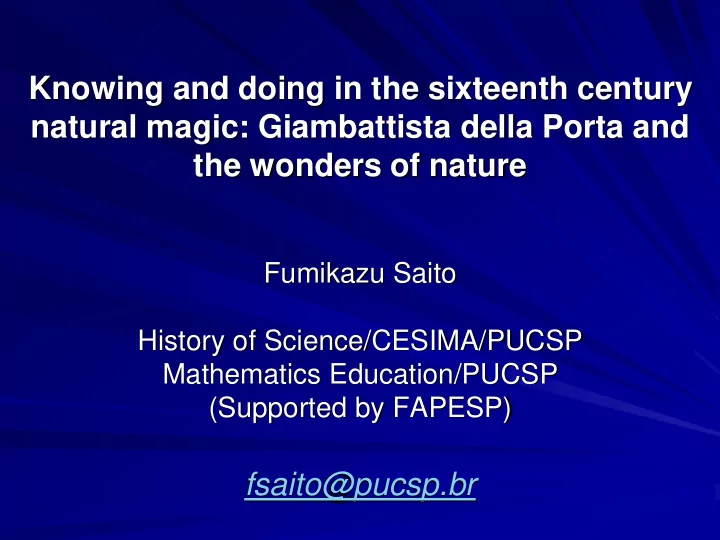

Knowing and doing in the sixteenth century natural magic: Giambattista della Porta and the wonders of nature Fumikazu Saito History of Science/CESIMA/PUCSP Mathematics Education/PUCSP (Supported by FAPESP) fsaito@pucsp.br
Natural Magic as a Practical Part of Natural Philosophy “ Quoniam ipsam Magiam activam; & naturalis Philosophiae portionem describimus …” “Seeing Magick, as seen before, is a practical part of Natural Philosophy…” Giambattista della Porta, Magia naturalis [1589], I, 2 Natural Magick [1658], I, 2
Magia naturalis 1589 1658
Artifice ( artificio ) Ars ( techne ) - Natura ( physis ) “ How to make; How to do...” Knowledge which depends on the ability of those who will manipulate phenomena and closely associated in meaning to “skill”
A broad acquired Knowledge: Philosophy Medicine Astrology Mathematics Optics ...
Artifex or Mechanicus Ingenium “[a magus ] (…) must be a skillful workman , both by natural gift, and also by the practice of his own hands” Giambattista della Porta, Magia naturalis [1589], I, 3 Natural Magick [1658], I, 3
dexterity of manipulating nature using necessary tools watching and imitating nature metamorphosis trial and retrial
Artifex or Mechanicus Magus = Expertus expertise
Extraordinary Phenomena (Singular phenomena) ( Mirabilia ) To manipulate nature from within in order to produce bigger wonders To have access to the most hidden secrets of nature in order to perfect it
Physical manipulation reconcile practices and theoretical speculations Simulation and emulation of nature
Devices and apparatuses Not only designed on an empirical basis to promote the understanding of nature, but also to make those powers ( vis ) which were developed within nature visible Those powers could be used artificially in the “laboratory” in order to uncover other occult aspects of nature or to use them for most practical purposes
Magical devices and apparatuses revealed subtle aspects of nature and follow a certain process of nature Devices and apparatuses were required to make nature reveal its secrecies
Devising [imitate the working process of nature] Improving [how to improve such processes] Knowing [understanding such processes] Nature could be controlled and manipulated Different tangible effects could be produced
Distillation Distillation is a process learned by the magician from nature itself Condensation Rarefaction It follows nature and reproduces phenomena It could be used as a tool to manipulate nature in order to make it reveal new phenomena
Art of distillation teach how to: “dewy vapors, spirits, lumpy, sticky or viscous humors and that very essence which is hidden in the depths and intimate parts of things”
Giambattista della Porta, De distillatione , I, 9
“Waters” Process involves digestion and successive distillation and circulation Quintessence Magistery Tincture Elixir Clissus (Giambattista della Porta, De distillatione , VIII, 4)
“(…) There are in a Plant, the root, leaf, flower, fruit and seed, and in every one of these parts, there is a peculiar nature. The operation is thus: Dig the roots when they are full of juice, the leaves when they are fresh and green, the flowers when they are blown, the fruit and seeds in their due time. Extract the spirits or essences out of all these by Distillation, Maceration or Calcination, or any other of the former wayes (…).” Giambattista della Porta, De distillatione , VIII, 9 Magia naturalis , X, 18
“(…) But when they are all extracted severally, one in the form of oyl, another of Salt or Liquor; then mix them all together, so that they may be conjoined and united in one body, which is called a Clissus ”. Giambattista della Porta, De distillatione , VIII, 9 Magia naturalis , X, 18
Final remarks Natural magic proposed to investigate nature horizontally instead of vertically as in Aristotelian fashion. Then knowledge in magic was expanded to the extent that new phenomena were assimilated and technical difficulties of apprehending them were overcome. Finally we can say that singular phenomena were connected to the general principles of natural philosophy by ties which arose from the intersection between the production of wonders and methods used to improve them.
Recommend
More recommend